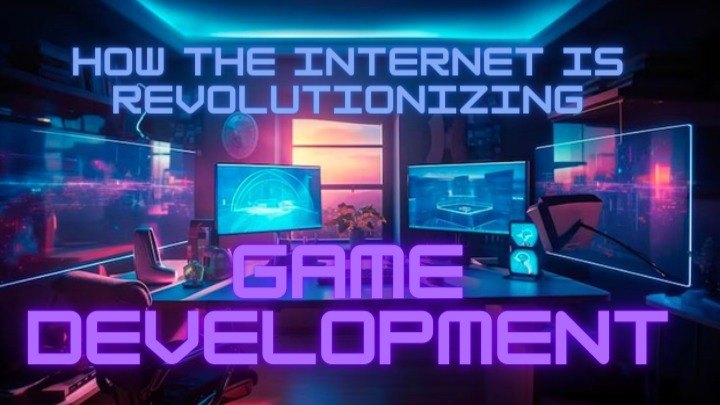
Game development is only one of the many businesses the Internet has changed. The world of game production has significantly changed with the rise of online connectivity, social interactions, and technological breakthroughs. The Internet revolutionizes the creation, distribution, and overall gaming experience, and we will examine these changes in this blog article.
Free online content has boosted this field a lot. For instance, Unity, a popular game development engine, offers free online courses that have helped millions of people learn how to create their own games. In fact, Unity boasts a user base of over 2.5 million active developers.
Online communities, platforms for distribution, and collaborative production are just a few ways the Internet has revolutionized the business world.
Collaborative development and global teams
The power of the Internet to promote collaborative efforts and bring together creators from all over the world is one of the most significant effects on game creation. In the past, game creation was frequently restricted to nearby local teams. However, the growth of online platforms has made it possible for developers to work remotely, exchanging ideas, assets, and code in real-time.
Despite geographical differences, developers may collaborate and work efficiently using online platforms like GitHub. Teams may effectively connect, communicate, and work together despite distance and time zone restrictions. Multinational game production teams have emerged. As a result, they are bringing together talents worldwide to produce unique and varied gaming experiences.
Crowdfunding and independent development
The Internet has democratized game production by giving independent game developers a venue to demonstrate their abilities and look for funding directly from the gaming community. Crowdfunding websites like Kickstarter and Indiegogo have transformed the funding model by enabling game developers to present their concepts to prospective gamers and raise money for their endeavors. Independent developers now have the means to realize their ideas thanks to this change in funding.
They can bypass traditional publishers and connect directly with passionate gamers eager to support innovative projects. By leveraging the power of the Internet, independent developers have gained the freedom to explore creative concepts and deliver unique gaming experiences that might have otherwise gone unnoticed.
Online communities and player feedback
The Internet has created vibrant communities of players and enthusiasts who actively engage with game developers. Online forums, social media platforms, and dedicated gaming communities have become virtual gathering places for discussions, bug reporting, and suggestions. Developers now have direct access to their player base, enabling them to gather valuable feedback and insights. Did you know that Steam, a popular gaming platform, has over 120 million active users worldwide?

Through online communities, developers can receive real-time feedback, uncover bugs, and address player concerns promptly. This direct line of communication fosters collaboration and shared ownership in the game development journey. Players feel engaged and invested in the process, while developers gain valuable insights to improve their games. This symbiotic relationship between developers and players has led to more player-centric game design and enhanced overall gaming experiences.
Game distribution and digital platforms
The Internet has completely transformed the way games are distributed and accessed. In the past, physical copies were the primary means of obtaining games. However, biological distribution networks have become less necessary with the rise of digital platforms and online marketplaces.
To find and purchase games, gamers increasingly throng to digital storefronts like Steam, Epic Games, and countless mobile app stores. These platforms let game developers release their titles without needing physical distribution infrastructure, providing them access to a sizable global audience. eSports business is on a great rise. The Internet has leveled the playing field for developers by enabling more upstart publishers to compete globally with smaller independent firms.
Furthermore, the Internet has enabled developers to seamlessly release game updates and downloadable content (DLC). Players can now enjoy new features, patches, and expansions without physical media. This has facilitated ongoing engagement with games and the ability to improve and evolve them based on player feedback continually.
Live updates, patches, and online services
The Internet has revolutionized the way games are supported and updated after release. To improve the game experience, developers can now offer live updates, fixes, and online services. With cross-platform play, cloud-based services, and online multiplayer capabilities, the Internet has become a crucial component of contemporary gaming experiences.
Live updates and patches allow developers to address bugs, balance gameplay, and introduce new features. This ongoing support ensures that games stay relevant and engaging long after release. The Internet also enables online services such as leaderboards, matchmaking, and multiplayer interactions, fostering community and connectivity among players.
Cloud gaming and streaming
A game-changing technology made possible by the Internet is cloud gaming. Without needing powerful hardware, players can stream games directly to their devices with cloud gaming systems like Google Stadia, Microsoft xCloud, and NVIDIA GeForce Now. This technology takes advantage of the speed and connectivity of the Internet to offer quick access to a vast game library.

By reducing hardware restrictions and gaining access to a larger audience, cloud gaming has the potential to revolutionize game production. Instead of stressing device compatibility, developers can concentrate on perfecting the game experience. Cloud gaming is anticipated to increase accessibility and immersion as internet speeds rise, revolutionizing how games are played and enjoyed.
Conclusion
With the internet as a powerful tool, the future of game development holds endless possibilities, and we can look forward to even more exciting and immersive games in the years to come.
Video games have a bright future thanks to the ongoing development of internet technology, particularly Wow Internet, which offers dependable high-speed connectivity. We can anticipate cutting-edge and immersive gaming experiences that push the boundaries of creativity and connectivity as game creators continue to utilize the power of the Internet. The Internet has entirely revolutionized the game, which has created new opportunities for game production industry collaboration, interaction, and amusement.
Overall, the Internet has transformed game development into a collaborative and dynamic process. It has opened up new opportunities for developers and players alike, making the gaming industry more inclusive and innovative. So, whether you’re a gamer or aspiring developer, the Internet has undoubtedly revolutionized the world of game development, making it an exciting and ever-evolving field.
